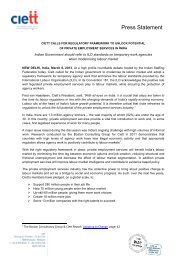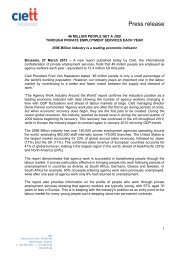1 | Page OPENING SPEECH OF HORACIO DE MARTINI ... - Adapt
1 | Page OPENING SPEECH OF HORACIO DE MARTINI ... - Adapt
1 | Page OPENING SPEECH OF HORACIO DE MARTINI ... - Adapt
You also want an ePaper? Increase the reach of your titles
YUMPU automatically turns print PDFs into web optimized ePapers that Google loves.
1 | P age<br />
<strong>OPENING</strong> <strong>SPEECH</strong> <strong>OF</strong> <strong>HORACIO</strong> <strong>DE</strong> <strong>MARTINI</strong> (CIETT PRESI<strong>DE</strong>NT)<br />
Lisbon, May 28 th 2009<br />
“From San Diego to Lisbon:<br />
How much have the financial and economic crises affected our industry?”<br />
Doctor, Vieira da Silva, Minister of Labor of Portugal, dear friend, Marcelino Pena Costa,<br />
President of APESPE (Asociación Portuguesa de Empresas del Sector Privado de Empleo),<br />
dear colleagues.<br />
In the name of the International Confederation of Private Employment Agencies (CIETT) and<br />
the representatives of the 21 different countries present today, representing Europe, Asia,<br />
Africa and the Americas, we wish to thank our Portuguese colleagues for hosting and giving<br />
us the opportunity to visit your wonderful country.<br />
First of all, I would like to acknowledge the efforts of APESPE in organizing an event of this<br />
kind, in this special moment in the World of Business. Thanks Carla, Deborah and Marcelino<br />
for your efforts and permanent support during these last months.<br />
We would also like to thank all of you for joining us and contributing by your presence to the<br />
celebration of the CIETT 2009 ANNUAL CONFERENCE.<br />
It was only seven months ago that we held our Conference 2008 in San Diego, California,<br />
United States.<br />
On that occasion we mentioned that:<br />
The world is crossing through a turbulent climate as consequence of one of the most serious<br />
financial crisis of the contemporary era.<br />
Today we may comment that still “the world is crossing through a turbulent climate as<br />
consequence of one of the most serious financial crisis of the contemporary era”.<br />
According to the latest figures published by the OECD, the number of unemployed is<br />
expected to rise by about 8 million over the next two years to reach 42 million.<br />
Compared to last year, the number of agency workers has decreased with double digit<br />
figures in all large markets (USA, Japan, France, Netherlands, Germany, Spain and others).<br />
However, despite this worrying news, economic growth continues at a slower pace in some
countries, depending on geography. Emerging countries, many of them producers of<br />
commodities, are affected by the crisis, but, up to now, to a lesser extent.<br />
Under these circumstances the market is functioning with increasing uncertainty in different<br />
aspects with regards to the World of Work:<br />
• Uncertain decisions about the number of staff to maintain<br />
• Extremely traumatic consequences as a result of reducing the work force.<br />
• Governments desperately trying to find tools and resources to stop the increase in<br />
unemployment, considering the economic and social risk that it represents to have<br />
millions without jobs.<br />
• It is taken for granted that the World of Work will be different after the crisis we are<br />
now suffering from.<br />
• A much more skilled work force will be needed.<br />
• Despite the global recession and the weakest employment outlook in decades,<br />
employers are facing a scarcity of talent in critical areas.<br />
• The concern about talent scarcity leaves doubts that once economic recovery takes<br />
place, it will be harder than ever to attract and retain people with key skills<br />
• And a long list of doubts and concerns.<br />
This growing uncertainly and its widening impact creates an urgent need for action.<br />
Our Confederation is helping policy makers in different countries with information and<br />
advice about how we may contribute to helping Governments increase employment with<br />
our knowledge and use of legal instruments to protect workers and employers though the<br />
triangular responsibility included in the Convention 181 of the ILO.<br />
Information, participation in different conferences and an active commitment with the ILO,<br />
allow us to be recognized in many countries as The Entity with Global knowledge and<br />
expertise in employment matters.<br />
Summarizing our contribution should be in these basic points of understanding:<br />
• Agencies Work helps companies to face global competitive pressure, allowing them<br />
to adapt their cost base and staffing levels.<br />
• As a result, the Agency Work industry will be the first to create jobs as soon as the<br />
economy recovers<br />
2 | P age
also<br />
• During difficult economic times, the matching role played by the AW industry<br />
between demand and supply of labour is even more crucial.<br />
• AW increases the participation rate in the labour markets by providing more work<br />
opportunities to more people.<br />
• Agency work not only creates jobs that would not otherwise have existed, but it also<br />
accelerates and increases the number of jobs created when the economy recovers.<br />
What we have to discuss during the next 2 days is where we are and where we’re going. We<br />
know for sure that there will be an end to this crisis, even though nobody knows when it will<br />
happen. But recovery will occur, resulting in a different labour market. And we, as an<br />
industry, must be prepared for it.<br />
In the Western World, we tend to have a negative conception of the word ‘Crisis’. But we<br />
should keep in mind that, looking at its etymology (ancient Greek κρίσις, krisis), this word<br />
has a double meaning. It means a change ‐ in good or in bad ‐ that occurs during a disease.<br />
We should seize the opportunity the crisis is bringing to think about the future of our<br />
market.<br />
As the OECD Secretary‐General Angel Gurría said recently: “If the opportunity is seized to<br />
make lasting reforms that will improve long‐term economic performance, we may look back<br />
at this period as one where we repositioned our economies to achieve stronger, cleaner and<br />
fairer growth”.<br />
So what can be done by our industry to ease the impact of the crisis and to promote the<br />
contribution of our sector to a better functioning labour market?<br />
1. We should keep on calling for reforming labour markets in order to make regulation<br />
more effective and unlock the contribution of agency work to job creation.<br />
Therefore, the level of regulation on (temporary) agency work should be adapted in<br />
order to unlock the industry’s contribution to better functioning labour markets. In<br />
some countries, there is a need to review and lift certain, unjustified restrictions<br />
imposed on the agency work industry (For instance, the use of AW in public<br />
administrations should be allowed all around the world). On the other hand, there is<br />
a need to legally recognise agency work in countries with no specific regulation or<br />
ban on agency work in order to facilitate the development of the industry and allow<br />
for more job creation. Ciett will keep on promoting ILO C181 as a relevant instrument<br />
to define regulation on our sector.<br />
2. We should keep on educating policymakers and other stakeholders on the positive<br />
role the AW industry plays in the labour market in terms of job creation and<br />
transitions.<br />
3 | P age
3. We as an industry should be associated with the design and implementation of active<br />
labour market policies. Public‐private partnerships should be further developed by<br />
strengthening the cooperation between public employment services and private<br />
employment agencies.<br />
4. We should ensure that our agency workers have access to the same rights with<br />
regards to social and unemployment protection. As examples, partial unemployment<br />
schemes have been extended o agency workers in Austria, Belgium, France,<br />
Netherlands, Germany<br />
5. And last but not least, we should advocate again and again that our industry plays a<br />
key role in preparing the grounds for an improved job‐creating economic recovery.<br />
How well are we “surviving” the crisis and how well prepared are we for the rebound that<br />
will take place in the near future? This will be for sure the main topic of discussion of the<br />
CIETT Conference 2009.<br />
To make this event productive, we have invited a number of specialists from all around the<br />
world to provide you with thoughts and advice on the topic of our conference<br />
“The Agency Work Industry in challenging economic times: Threats and opportunities”<br />
Have a great conference!<br />
Thanks.<br />
4 | P age











